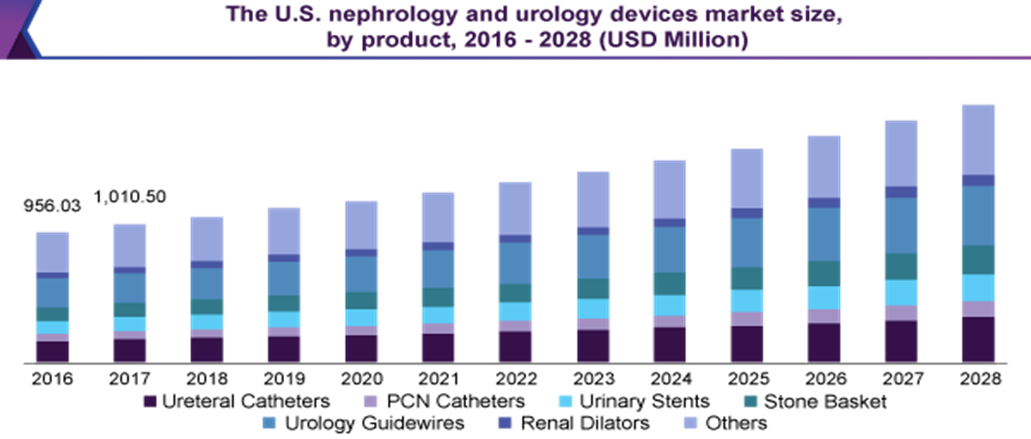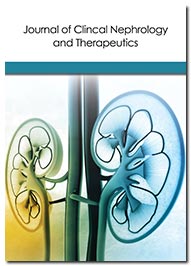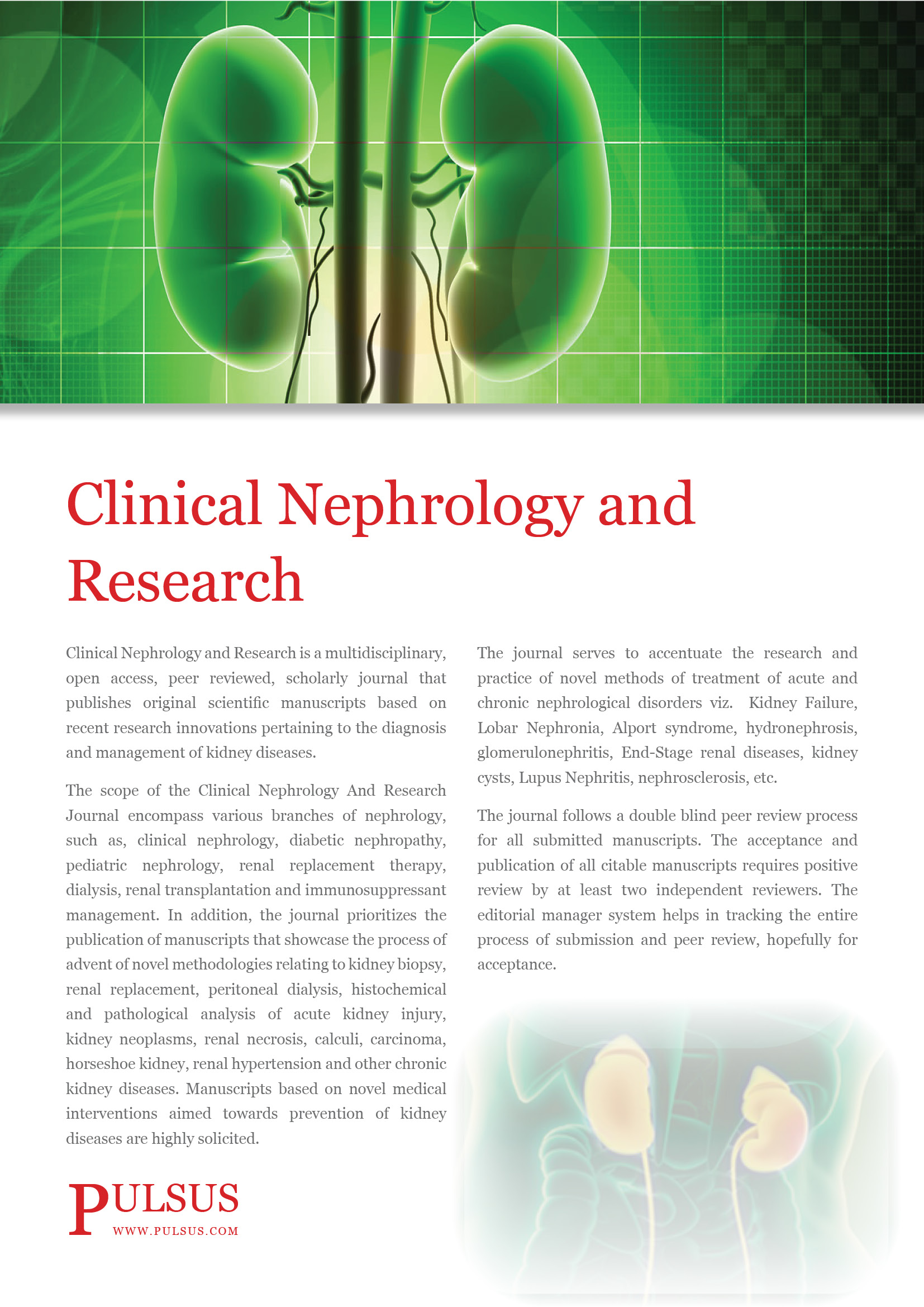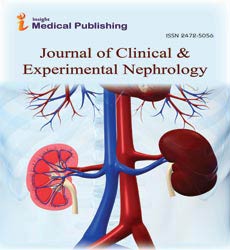Theme: Current and Emerging issue in the Nephrology, Urology and Therapeutics
Nephrology Congress 2021
The main goal of this International conference on Nephrology, Urology and Therapeutics is to bring together all Urologists, Therapeutics and Nephrology experts, and other specialists on one platform to share their ideas and knowledge across disciplines in order to facilitate research and clinical collaboration. It also serves as a meeting place for academics and practitioners from a variety of fields.
It is our pleasure to invite you to attend the international conference on nephrologycongress-2021
nephrologycongress-2021 Nephrology Urology and Therapeutics, which will primarily focus on how Current and Emerging issue in the Nephrology, Urology and Therapeutics and Development as well as within the field of Nephrology.
We are extremely thrilled to welcome all of the prominent people from all over the world to the 19th International Conference on Nephrology, Urology and Therapeutics, Which will be held on December 10-11, 2021 in Dubai, UAE.
We are truly honoured to welcome all of the attendee’s keynotes, oral presentations, poster presentations, an exhibition, and a workshop will all be held on time.
It is an International platform for exhibiting research papers about different areas of Nephrology and current technologies used for the enhancement of people health.
Some of the other reasons are presenting a paper, networking for future collaboration, to expand your knowledge and find solutions, presenting your ideas, learn beyond your field of interest, publication, traveling, and certificates to improve your CV, Discover the latest trend in your sector, Sharper your skills, Improve your presentation and communication skills, Meet your academic scientist etc.
Target Audience:
Therapy Manufacturing Companies
Nephrology Associations and Societies
International Society of Nephrology
Track 1: Clinical Nephrology
Nephrology is a discipline of medicine that focuses on the diagnosis and treatment of kidney illnesses. It deals with the function and diseases of the kidneys. The kidneys are a pair of retroperitoneal organs located between the T12 and L3 vertebral bodies. A fibrous capsule surrounds the kidney, which is bordered by pararenal fat. The renal parenchyma, which includes the renal cortex and medulla, and the renal sinus, which includes the renal pelvis, calyces, renal arteries, nerves, lymphatics, and perirenal fat, can be split. The cortex and medulla are the two layers of the renal parenchyma. The renal cortex is located on the periphery of the capsule, while the renal medulla is made up of 10-14 renal pyramids separated by renal columns, which are extensions of the renal cortex. Filtration and excretion of metabolic waste products (urea and ammonium); management of required electrolytes, fluid, and acid-base balance; and encouragement of red blood cell synthesis are all critical activities of the kidneys. They also govern water reabsorption and maintain intravascular volume by regulating blood pressure through the renin-angiotensin-aldosterone pathway. The kidneys also reabsorb glucose and amino acids, and they regulate hormones through the activation of erythropoietin, calcitriol, and vitamin D.
Track 2: Kidney Diseases
Kidney diseases, often known as nephropathy or renal disease, cause damage to the kidneys. Nephritis is a non-firey kidney infection that causes incendiary renal pollution. Renal disappointment and urinary organ pain are occasionally caused by kidney illnesses. Kidney injury that is severe Previously known as severe renal failure, this condition is defined by a rapid loss of the kidney's excretory capacity and is frequently detected by the accumulation of finished nitrogen digestion (urea and creatinine) or decreased pee yield, or both. Constant kidney infection, also known as everlasting renal failure, is characterised by a constant decline of kidney function. It includes issues such as hypertension, fragility (low blood count), feeble bones, poor nutritional health, and nerve damage. Kidney disease can also increase the risk of heart and vascular disease.
Track 3: Kidney Transplantation
The organ transplantation of a kidney into a patient with end-stage kidney disease is known as kidney transplantation or renal transplantation. Transplanting a kidney from a deceased donor, also known as cadaveric or living donor transplantation, relies on the given organ's wellspring. Living donor kidney transplants are formerly differentiated as non-related living transplants or, Depending on whether the kidney donor and receiver have a biological tie, live donor kidney transplants were previously classified as non-related living transplants or living related transplants. Exchanges and chains are a unique approach to expanding the pool of living donors.
of the kidneys dies in acute tubular necrosis. The most prevalent causes include nephrotoxic medications and low blood pressure. Diabetes insipidus is a disorder in which the kidneys inhibit water from being excreted Hypocalcemia and a slew of other nephrology-related case reports Every nephrologist has completed considerable training in general internal medicine, and many nephrologists treat their patients for reasons other than renal disease. If patients observe any changes in their health, they should notify their renal doctors.
Track 5: Kidney Cancer
Kidney cancer (also known as renal adenocarcinoma or renal cell cancer) is a condition in which cancer cells develop in the tubule lining of the kidney. We have two kidneys, one on each side of the spinal cord, just above the waist, hidden beneath the peritoneum. The blood is purified by small tubules in the kidneys. Urine was generated from unabsorbed products"The produced urine enters the bladder through a lengthy tube known as the bladder." The pee is stored in the bladder until it is expelled from the body through the urethra. Urine is kept in the bladder until it is expelled from the body through the urethra. Kidney cancer may be clinically oblivious during the most of its course. Immunomodulatory agents and targeted therapy are the standard of care in metastatic disease patients Kidney cancer. The most common malignant disease affecting kidney is kidney cancer. One of the most common causes for kidney cancer is smoking.
Track 6: Nephrology Diagnostic
Diagnostic imaging is a method and technique for creating visual representations of the inside of a body for clinical inquiry and intervention. Treatment for renal disease differs depending on the stage of the disease and whether or not elective individual components are used. Pro will frequently suggest either renal dialysis or a kidney transplant for those whose kidneys no longer function normally without renal care. Steroid medications, blood products, plasma exchange, and dialysis are all part of nephrological care Kidney problems will have a substantial impact on life quality and length, and nephrology will require mental assistance, wellness training, and advanced care planning.
Track 7: Radiation Techniques
Diagnostic imaging is a technique for creating visual representations of the inside of a body for clinical examination and demonstrative intervention. Diagnostic imaging focuses on revealing internal structures buried beneath the skin and bones, as well as analysing and treating disease. Although imaging of excised organs and tissues can be done for medical reasons, it is not recommended, such procedures are typically classified as pathology rather than medical imaging. Radiation therapy can be delivered externally or inside. The implantation of a small amount of radioactive material (seeds) in or near the kidney disease is known as interior radiation, or brachytherapy. Renal hypertension, or high blood pressure caused by constriction of the renal arteries that deliver blood to the kidneys, is diagnosed using angiography. Ultrasound could be used to perform an initial assessment. In kidney illnesses, an MRI uses a big and powerful magnet. The body's hydrogen ions are employed to create images of the various body components. In the case of the kidney, however, an MRI provides the same information as a CT scan.
Track 8: Reconstructive Urology
The urinary and regenerating tracts are inextricably linked, and obstructions in one can have a negative impact on the other. Along these lines, the genitourinary issue encompasses a wide spectrum of conditions regulated in urology. Urology is a branch of medicine that organises both surgical and nonsurgical disorders, Urinary tract pollutions and altruistic prostatic hyperplasia, for example, both of which are associated with cautious situations. Bladder or prostate cancer, kidney stones, genetic alterations, kidney damage, and stress incontinence are examples of models..
Track 9: Kidney Diseases
Kidney diseases, otherwise called nephropathy or renal infection, are harm to or ailment of a kidney. Nephritis is inflammatory kidney infection. Nephrosis is non-inflammatory kidney diseases. Kidney diseases usually affect kidney failure and kidney damage. In this context, infection refers to the auxiliary and causing illness entity, whereas kidney failure refers to the damaged kidneys. For example, in general usage, the phrases chronic kidney disease and chronic renal failure are usually considered interchangeable. Acute kidney disease is commonly referred to as acute renal failure.
Track 10: Pediatric Nephrology
(AKI) is a common problem in paediatric and neonatal intensive care units, where Renal transplantation treatment is frequentAcute kidney injury ly used in children whose stable treatment isn't up to the task of meeting metabolic demands. The most of the time,peritoneal dialysis is progressively favoured for youngsters in the hours of renal transplantation as a result of the non-multifaceted nature of the strategy. In the vast majority of the paediatric end arrange renal nephrology sickness, peritoneal nephrology dialysis is increasingly favoured as it very well may be done even at the home.
Track 11: Chronic Kidney Diseases
Chronic renal disease is a debilitating condition that does not improve with time. High blood pressure is the most common cause. You may have few indications or symptoms in the early stages of chronic renal disease. It's possible that chronic kidney disease won't become apparent until your kidney function has been considerably diminished Chronic kidney disease usually worsens over time, and symptoms may not occur until the kidneys have been severely damaged. If you have advanced CKD and are close to kidney failure, you may experience symptoms caused by waste and excess fluid accumulating in your body.
Track 12: Kidney Stone
Another common kidney issue is kidney stones. When minerals and other elements in the blood crystallise in the kidneys and form solid masses, they are known as kidney stones. Urination is the most common way for kidney stones to leave the body. Kidney stones can be excruciatingly painful to pass, but they seldom result in serious complications A kidney stone is a solid piece of material that forms in the kidney as a result of urine components. It could be as small as a speck of sand or as big as a nugget. The majority of kidney stones move through the body without the need for medical assistance. However, every now and then, a stone refuses to disappearIt has the potential to become lodged in the urinary tract, obstructing urine flow and causing severe throbbing. Kidney stones can also be eliminated with the use of medications or shock waves. Shock waves are delivered using a scope inserted into the urethra, the channel that transports urine from the body. The following may be signs of kidney stones that need a doctor's help:
Extreme pain in your back or side that will not go away
Urine that smells bad or looks cloudy
A burning feeling when you urinate
Track 13: Acute kidney failure
Acute kidney failure occurs when your kidneys suddenly lose the ability to remove excess salts, fluids, and waste materials from the blood. This elimination is the core, kidneys’ main function. Body fluids can upswing to dangerous levels when kidneys lose their filtering capacity. The disorder will also cause electrolytes and waste material to accumulate in your body, which can also be life-threatening.
Acute kidney failure is also known as acute renal failure or acute kidney damage. It's very prevalent among those who have been in the hospital before. It may happen in a matter of hours. Acute renal failure is a life-threatening condition that requires aggressive care. It may, however, be revoked.
Some of the complications of acute kidney failure include:
Chronic kidney failure
Heart damage
Nervous system damage
End-stage renal failure
High blood pressure
Track 14: Drugs and Medication for Kidney Diseases
The majority of kidney disease treatment focuses on addressing the disease's underlying cause. This means that your doctor will help you manage your blood pressure, blood sugar, and cholesterol levels more effectively. There are frequently no indications or symptoms in the early stages of renal disease. The only way to find out how well your kidneys are working is to have them tested. If you have diabetes, high blood pressure, heart disease, or a family history of renal failure, it's critical to get checked for kidney disease.
Below class of drugs that are regularly used in general:
Anti-hypertensives to control your blood pressure
Diuretics to increase your urine output
Medications to keep your heart healthy
Phosphate binders to control your phosphate levels
Vitamin D to maintain strong bones and other benefits
Track 15: Urinary Tract Infection
An infection of the kidneys, ureters, bladder, or urethra is known as a urinary tract infection (UTI). Infections of the upper or lower urinary tract are possible. As a rule, the more serious the infection, the more likely it is to affect adults rather than children Urinary tract infections are the second most prevalent type of infection after respiratory infections.
Track 16: Nephrological Treatment
Steroid medicines, blood products, dialysis, and plasma exchange are all used in nephrological care. Because kidney issues can have a substantial influence on quality and length of life, nephrology emphasises psychological support, health education, and advanced care planning.
Extra corporeal shock wave lithotripsy(ESWL)
Beta-Adrenoceptor Antagonists (Beta-Blockers)
Alpha-Adrenoceptor Antagonists (Alpha-Blockers)
Angiotensin Converting Enzyme (ACE) Inhibitors
Track 17: Diet for Kidney Health
Dietary restrictions vary depending on the severity of renal damage. It's vital to keep track of everything you eat and drink if you have chronic kidney disease (CKD). This is because your kidneys are incapable of properly excreting waste from your body. A food plan that is kidney-friendly will help you to stay healthier for longer.
Track 18: New Updates in Nephrology and Hypertension
Patients with chronic kidney disease (CKD) and diabetes mellitus are more likely to have hypertension. Many persons with diabetic kidney disease have high blood pressure (DKD). Inability to properly treat hypertension in this group of patients increases the risk of cardiovascular high blood glucose, also known as glucose intolerance, for example, can cause damage to the veins of the kidneys. When veins are damaged, they don't function properly, and a large proportion of people with diabetes develop hypertension, which can injure the kidneys. Macro albuminuria (egg whites to keratinize ratio) is a symptom of diabetic kidney disease. [ACR] >35 mg/moll [400 mg/g]), or micro albuminuria (ACR 3.5-35.0 mg/mmol [35-400 mg/g]) associated with retinopathy (type 1 or type 2), as well as type 1 diabetes mellitus for more than 11 years (T1DM). If these conditions are met, diabetes mellitus can be the cause of persistent renal disease in many diabetic people. Different causes of diabetic kidney disease should be examined in the context of any of the following conditions: GFR that is rapidly deteriorating, the absence of diabetic retinopathy, the presence of dynamic urinary dregs, or signs or symptoms of another fundamental disease19.
Pediatric Urology & Female Urology
Track 19:Urology
The drainage system in our bodies is utilised to eliminate pee. Wastes and water make up the majority of urine's composition. Kidneys, ureters, and bladders make up the urinary tract. The urinary tract must operate together in a systematic order for appropriate urination to occur. Urological disorders and conditions include, among others, urinary tract infections, kidney stones, bladder control issues, and prostate issues. Certain urologic conditions have a limited duration of existence, whereas others have a long duration.
The global nephrology devices market accounted for $12,012 million in 2018 and is expected to reach $16,421 million by 2026, registering a CAGR of 4.0% from 2019 to 2026.
The global nephrology and urology devices market size was valued at USD 4.34 billion in 2020 and is expected to grow at a compound annual growth rate (CAGR) of 6.6% from 2021 to 2028. The high incidence and prevalence of Chronic Kidney Disease (CKD) coupled with rising elderly population is the major factor driving the market growth. According to the estimates of the National Kidney Foundation, 10.0% of the worldwide population is affected by CKD. Thus, the increasing target population is boosting the overall product demand. Rising incidences of diabetes and high blood pressure (hypertension) globally are also contributing to the growth of the market as these two diseases are primary reasons for kidney failure. As per the data published by the American Kidney Fund, 38.4% of kidney failures are caused due to diabetes, and 25% due to high blood pressure.
This high correlation between kidney failure and aforementioned disorders is expected to accentuate the demand for urology & nephrology devices. Moreover, the cases of diabetes and hypertension are increasing in developing countries of Asia Pacific (APAC) & Middle East and North Africa (MENA) regions, owing to changes in lifestyle and rising geriatric population. For instance, as per the International Diabetes Federation, in 2019, the number of diabetes cases in the IDF MENA region was 55 million, which is estimated to reach 108 million by 2045. These factors are expected to increase product use and demand during the forecast period.
In addition, the market is expected to be driven by the increasing geriatric population, which is highly susceptible to various diseases including kidney and urinary disorders. As per the WHO, the number of people aged 65 years and above is expected to rise from 7% in 2000 to 16% in 2050, globally. Old age is considered one of the greatest risk factors for developing various medical conditions. Aging also weakens the immune system and consequently increases a patient’s susceptibility to various ailments, such as renal disorders, diabetes, prostate cancer, and urinary retention. According to the American Society of Nephrology, urologic diseases are the third-most common concern among the geriatric population, and these account for approximately 47% of physician visits.

Conference Series LLC Ltd hosted the “15th World Nephrology Conference”, during May 20-21, 2019 Tokyo, Japan, at Melbourne, Australia with the theme, “Recent advancements of research and treatment in the field of nephrology” which was a great success. Eminent keynote speakers from various reputed institutions and organizations addressed the gathering with their resplendent presence.
We extend our grateful thanks to all the momentous speakers, conference attendees who contributed towards the successful run of the conference.
World Nephrology 2019 witnessed an amalgamation of peerless speakers who enlightened the crowd with their knowledge and confabulated on various latest and exciting innovations in all areas of Nephrology research.
World Nephrology 2019 Organizing Committee extends its gratitude and congratulates the Honorable Moderators of the conference, Dr. Piyush Gondaliya, NIPER-A, India for his remarkable contribution towards smooth functioning of this esteemed event.
Conference Series LLC Ltd would like to thank all the Honorable Guests and Keynote Speakers of World Nephrology 2019
Dr. Ajdinovic Boris, Military Medical Academy, Serbia
Dr. Kuo-Cheng Lu, Taiwan Society of Nephrology, Taiwan
Dr. Shena Jo A. Capucion, National Kidney and Transplant Institute, Philippines
Conference Series LLC Ltd is privileged to felicitate World Nephrology 2019 Organizing Committee, Keynote Speakers, Chairs & Co-Chairs and also the Moderator of the conference whose support and efforts made the conference to move in the path of success. Conference Series LLC thanks every individual participant for the enormous exquisite response. This inspires us to continue organizing events and conferences for further research in the field of Nephrology.
Conference Highlights
- Clinical Nephrology
- Kidney Diseases
- Kidney Transplantation
- Types of Kidney Stones
- Kidney Cancer
- Nephrology Diagnostic
- Radiation Techniques
- Reconstructive Urology
- Kidney Diseases
- Pediatric Nephrology
- Chronic Kidney Diseases
- Kidney Stone
- Acute kidney failure
- Drugs and Medication for Kidney Diseases
- Urinary Tract Infection
- Nephrological Treatment
- Diet for Kidney Health
- New Updates in Nephrology and Hypertension
- Urology
To share your views and research, please click here to register for the Conference.
To Collaborate Scientific Professionals around the World
| Conference Date | December 10-11, 2021 | ||
| Sponsors & Exhibitors |
|
||
| Speaker Opportunity Closed | |||
| Poster Opportunity Closed | Click Here to View | ||
Useful Links
Special Issues
All accepted abstracts will be published in respective Our International Journals.
- Journal of Clinical Nephrology and Therapeutics
- Clinical Nephrology and Research
- Journal of Clinical & Experimental Nephrology
Abstracts will be provided with Digital Object Identifier by



